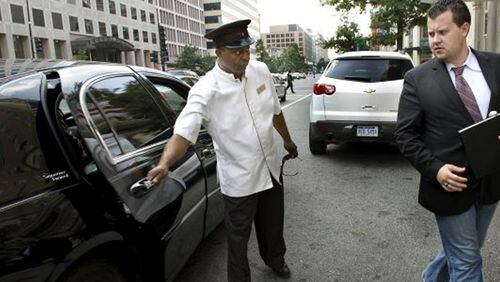Comprehensive coverage
The Atlanta Journal-Constitution will have Georgia’s largest team covering the Legislature in January. No one will have more expertise on issues that matter to taxpayers when legislators return.
State lawmakers this week heard two days of testimony on the rise of ride-sharing services Uber and Lyft, with the upstart companies alternately praised as groundbreaking and vilified as interlopers who don’t think the rules apply to them.
The challenge now for legislators, especially those in the Republican majority who will largely decide what happens, is ensuring public safety and a level-playing field while honoring the popularity of these companies with younger voters and not angering conservative voters who despise new government regulations.
The For Hire Transportation Service Committee, created earlier this year after legislation to regulate Uber and similar car services failed in the past session of the General Assembly, heard testimony from witnesses on all sides of the issue.
In the end, the panel was left with several issues that will likely be addressed in the legislative session that begins Jan. 12: whether the background checks for drivers go far enough, whether the drivers carry the proper insurance, and whether the drivers and companies are paying taxes.
The companies themselves, while calling their background checks more than adequate and their insurance top-notch, say they don’t oppose regulation, as long as it allows them to maintain their uniqueness. They also say they are working with the Department of Revenue to satisfy their tax obligations.
“We’re providing a service folks didn’t realize they needed, but as soon as they have access to this kind of technology, they realize it’s a huge convenience,” Nick Zabriskie, a public policy associate for Uber, told lawmakers.
“In the Southeast, there’s an absence of regulations on the books,” he said. “We look forward to working with the committee.”
The issues surrounding these startup companies are not unique to Georgia. States and cities across the country are grappling with how to handle so-called ride-sharing firms. Uber's business model, in particular, is to announce service in a state or city and essentially dare governments to regulate it. If lawmakers move to do so, the company rallies its ardent fans, who appreciate the technology vibe of the company, as well as the generally lower rates and cleanliness of the cars.
State Rep. Alan Powell, R-Hartwell, the chairman of both the House Public Safety Committee and the special study committee, said he was shocked by the volume of vitriol he received after proposing regulations this past legislative session.
“I certainly didn’t realize I was stepping into a hornet’s nest,” Powell said.
Taxi cab and limousine companies testified Wednesday that Uber and Lyft are being allowed to skip the rules they have had to meet for years, all while not paying taxes and endangering public safety.
“Uber and Lyft insult my intelligence, and I hope they insult yours,” Les Schneider, an attorney and lobbyist for the Georgia Limousine Association, told the committee. “The system shouldn’t be gamed so the truth gets stifled and silenced.”
Schneider was particularly irate that Uber and Lyft drivers are not required to be fingerprinted and pass a state criminal background check.
“If you can fingerprint people who serve alcohol, if you fingerprint people who buy a gun, is it a lot to ask to fingerprint people who are going to drive around your family?” Schneider asked.
Uber and Lyft, however, claim that their background checks, which incorporate seven years of records, checks against sex-offender registries and more, are as good if not better than the state’s.
Powell said he expects the committee to issue its recommendations by the end of the year.







